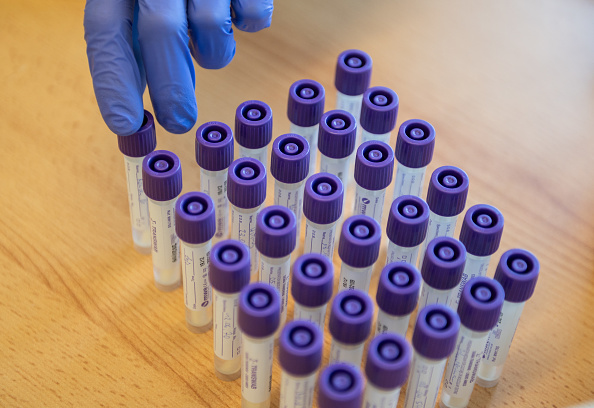
More than a month after they first announced plans to offer Covid-19 tests in parking lots, the heads of several retailers returned to the White House Rose Garden to promise more testing sites.
When President Donald Trump declared a state of emergency 45 days ago, he brought forth a crowd of retail executives with promises of widespread drive-thru testing. So far, those plans have been slow to come to fruition.
At the time, Trump had said 5 million tests will be available within the next month. He also had indicated retailers would roll out a number of drive-thru testing sites, with Google building a website to help people find testing at a nearby location.
“Google is helping to develop a website. It’s going to be very quickly done … to determine whether a test is warranted and to facilitate testing at a nearby convenient location,” Trump said. “We cover very, very strongly our country. Stores in virtually every location.”
As of Monday, a total 5.59 million Covid-19 tests have been conducted in the U.S., according to the COVID tracking project. The triage tool created by Google’s sister company, Verily, is currently limited to nine states. And so far, retailers have rolled out a limited number of testing sites.
Walgreens currently operates 18 drive-thru testing locations across 11 states, and CVS Health is currently operating rapid-testing offsite in five states. Walmart currently has 20 testing sites across 11 states, and Rite Aid has 25 locations across eight states. Target isn’t currently operating any drive-thru testing sites, as it doesn’t have any pharmacists or medical professionals on staff.

A Deep-dive Into Specialty Pharma
A specialty drug is a class of prescription medications used to treat complex, chronic or rare medical conditions. Although this classification was originally intended to define the treatment of rare, also termed “orphan” diseases, affecting fewer than 200,000 people in the US, more recently, specialty drugs have emerged as the cornerstone of treatment for chronic and complex diseases such as cancer, autoimmune conditions, diabetes, hepatitis C, and HIV/AIDS.
At a Rose Garden press conference on Monday, company executives promised more tests in the coming months.
Walgreens has said it will offer Covid-19 tests in 49 states and triple its testing volume, though it hasn’t confirmed a timeframe for its plans. It plans to use LabCorp’s nasal swab diagnostic test, which allows patients to collect a sample themselves, as opposed to nasopharyngeal swabs, which must be done by a healthcare professional.
CVS said it would add testing capabilities at up to 1,000 CVS pharmacies next month, using its drive-thrus and parking lots. Walmart, for its part, said it would add 45 sites in the next week and 100 by the end of May.
“Our industry has been united by the unique role we can play in addressing the pandemic and protecting people’s health,” CVS Health CEO Larry Merlo said in a news release. “We all share the same goal, and that’s dramatically increasing the frequency and efficiency of testing so we can slow the spread of the virus and start to responsibly reopen the economy when experts tell us it’s safe.”
Even as the U.S. tries to catch up in testing, the numbers of tests that have been conducted still vary widely by state. The two most populous states, California and Texas, still fall far behind New York in testing.
California, with a population of 39 million, has conducted 553,409 tests so far. Texas, with a population of 29 million, has conducted 290,517. Meanwhile, New York, with a population of 19.5 million, has conducted 826,095 tests, according to the COVID Tracking Project.
Photo Credit: David Hecker, Getty Images













